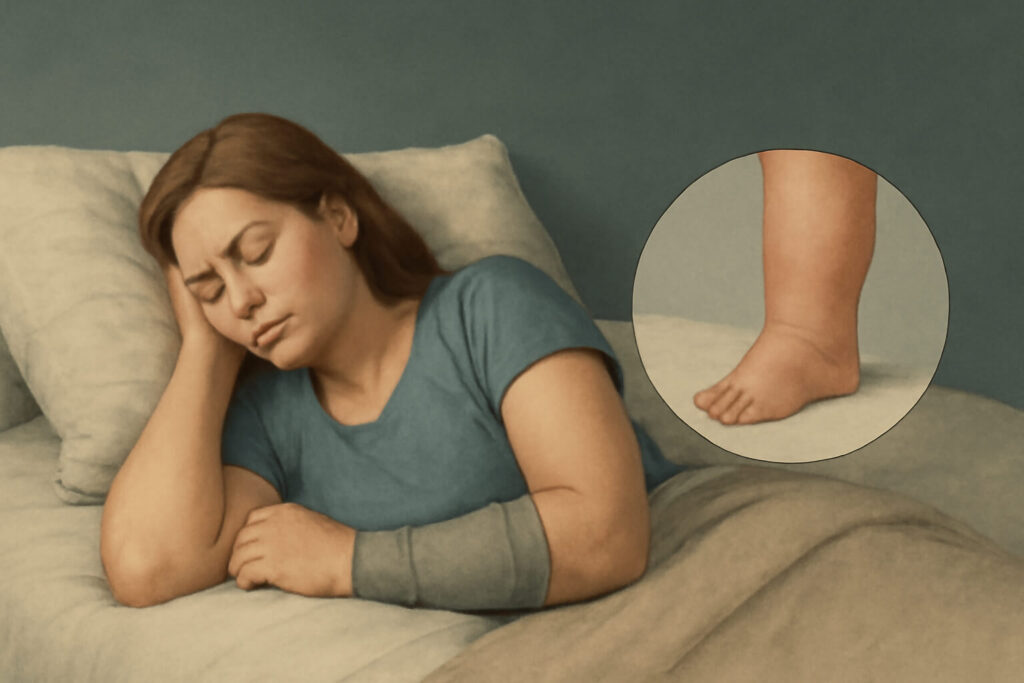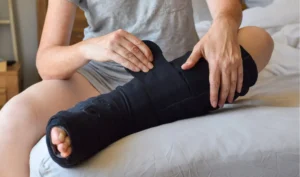Welcome! Cancer-related lymphedema can significantly impact a person’s life, leading to physical discomfort and emotional distress. This article explores the intricate relationship between sleep quality and decongestive therapy in the context of cancer-related lymphedema, particularly focusing on breast cancer. We will delve into how lymphedema affects sleep quality, and how effective lymphedema management strategies, including decongestive therapy, can improve the quality of life for those affected.
What is Lymphedema?
Lymphedema is a chronic condition characterized by the buildup of fluid in the lymphatic system, leading to swelling, most commonly in the arms or legs. This occurs when the lymphatic system, responsible for draining fluid, waste, and toxins from the body, is damaged or blocked. As a result, lymphatic fluid accumulates, causing discomfort and potentially leading to complications such as infections and reduced mobility. Understanding lymphedema is crucial for effective lymphedema management and improving the quality of life of those affected.
Causes of Cancer-Related Lymphedema
Cancer-related lymphedema often arises as a consequence of cancer treatment, particularly surgery and radiation therapy, which can damage or remove lymphatic nodes and vessels. Breast cancer surgery, for instance, frequently involves the removal of axillary lymph nodes, increasing the risk of breast cancer-related lymphedema. Other cancers and their treatments can also contribute to secondary lymphedema. Understanding the specific causes is essential for implementing targeted lymphedema management strategies and improving the quality of life for patients.
Types of Lymphedema: Primary vs Secondary
Lymphedema is broadly categorized into primary and secondary lymphedema. Proper identification of the type of lymphedema is crucial for tailoring appropriate treatment of lymphedema and enhancing the quality of life.
| Type of Lymphedema | Cause |
|---|---|
| Primary Lymphedema | Rare, inherited condition caused by malformations in the lymphatic system. |
| Secondary Lymphedema | Damage to the lymphatic system caused by external factors such as surgery, radiation, infection, or trauma. Cancer-related lymphedema falls under this category. |
Lymphedema can profoundly affect numerous facets of an individual’s well-being, and sleep quality is certainly among them. The presence of lymphedema symptoms, such as swelling, pain, and restricted mobility, can significantly disrupt nighttime rest, leading to sleep disturbance and impacting the overall quality of life. Effective lymphedema management is essential to alleviate these symptoms and promote better sleep, thereby enhancing the quality of life for patients suffering from this chronic condition. This is particularly important for breast cancer survivors who may already be dealing with multiple health challenges.
The Impact of Sleep on Quality of Life
Why Sleep Quality Matters
Adequate sleep quality is vital for maintaining both physical and mental health. During sleep, the body repairs tissues, consolidates memories, and regulates hormones. Disrupted sleep patterns can lead to various health problems, including weakened immune function, increased pain sensitivity, cognitive impairment, and mood disorders. For lymphedema patients, achieving better sleep is not just about feeling rested; it’s about supporting their overall health and enhancing their quality of life, particularly for breast cancer survivors with lymphedema.
How Lymphedema Affects Sleep
Lymphedema can significantly disrupt sleep quality due to several factors. The discomfort and pain associated with swelling in the affected limb, whether it’s upper limb lymphedema or limb lymphedema, can make it difficult to find a comfortable sleeping position. Additionally, the constant sensation of heaviness or tightness in the limb can lead to frequent awakenings throughout the night. These disruptions result in poor sleep, which further exacerbates the physical and emotional challenges faced by people with lymphedema, notably breast cancer patients undergoing cancer treatment.
Consequences of Poor Sleep Quality
The consequences of poor sleep in patients with lymphedema extend far beyond daytime fatigue. Chronic sleep disturbance can worsen pain perception, increase the risk of infection, and impair cognitive function, making it harder to manage the condition effectively. Additionally, poor sleep can negatively impact mental health, leading to increased anxiety and depression. Addressing lymphedema and sleep issues is crucial for lymphedema management and enhancing the overall quality of life for individuals living with lymphedema, including breast cancer related lymphedema and general cancer-related lymphedema. Furthermore, it’s worth noting that some patients with breast cancer may also experience sleep apnea, further compounding sleep disturbance. [Insert Internal Link]
Decongestive Therapy Explained
What is Decongestive Therapy?
Decongestive therapy, also known as complex decongestive therapy (CDT), is a comprehensive approach to lymphedema management. It aims to reduce swelling, improve lymphatic drainage, and enhance the quality of life for patients with lymphedema. This therapy is particularly beneficial for individuals living with lymphedema resulting from cancer treatment, including breast cancer related lymphedema. Decongestive therapy typically involves a combination of techniques tailored to the individual’s specific needs, managed by a trained lymphedema therapist.
Components of Complex Decongestive Therapy
Complex decongestive therapy for lymphedema involves several key components, including manual lymphatic drainage, compression therapy, meticulous skin care, and remedial exercises. Two of these components are described in more detail below:
| Component | Description |
|---|---|
| Manual Lymphatic Drainage (MLD) | Gentle massage techniques to stimulate lymphatic flow and reduce fluid buildup. |
| Compression Therapy | Utilizes bandages or a compression garment to support the lymphatic system and prevent re-accumulation of fluid. |
Skin care is essential to prevent infections, while exercises help to improve sleep quality and promote lymphatic drainage. Together, these components offer comprehensive treatment of lymphedema.
Effect of Complex Decongestive Therapy on Lymphedema
The primary effect of complex decongestive therapy is to reduce lymphedema symptoms, such as swelling, pain, and heaviness in the affected limb. By promoting lymphatic drainage and preventing fluid accumulation, decongestive therapy can significantly improve sleep and quality of life for lymphedema patients. Effective lymphedema management through decongestive therapy also helps to minimize the risk of complications, such as infections and skin breakdown. Furthermore, breast cancer survivors with lymphedema often find that decongestive therapy enhances their overall well-being. [Insert Internal Link]
Improving Sleep Quality for Individuals with Lymphedema
Practical Tips for Better Sleep
To improve sleep quality when living with lymphedema, consider these tips. Some involve lifestyle adjustments, while others focus on creating a comfortable sleep environment.
| Category | Tip |
|---|---|
| Lifestyle | Engage in gentle exercises to reduce swelling and avoid caffeine or alcohol before bedtime. |
| Environment | Ensure a comfortable mattress and pillows to find a comfortable sleeping position. Elevate the affected limb to promote lymphatic drainage. |
Additionally, creating a relaxing bedtime routine, such as taking a warm bath or reading a book, can also help to improve sleep, especially for patients with breast cancer related lymphedema.
Role of Compression Garments
Compression garments play a crucial role in managing lymphedema and, consequently, enhancing sleep quality. Wearing a properly fitted compression garment during the day helps to control swelling and prevent fluid from accumulating in the affected limb. This can lead to reduced discomfort and pain at night, making it easier to improve sleep. Some individuals may also benefit from wearing a compression garment while sleeping, but it’s essential to consult with a lymphedema therapist to determine the most appropriate approach. Properly utilizing compression therapy can significantly improve the quality of life.
Setting a Sleep Routine
Establishing a consistent sleep routine is vital for lymphedema patients aiming to improve sleep quality. Going to bed and waking up at the same time each day helps regulate the body’s natural sleep-wake cycle. Creating a relaxing pre-sleep environment, such as dimming the lights and avoiding screen time, can also promote better sleep. For breast cancer survivors with lymphedema, a stable sleep routine can be particularly beneficial in managing lymphedema symptoms and enhancing the overall quality of life. Additionally, consider consulting with a lymphedema therapist to address specific challenges that might cause sleep disturbance, such as pain or discomfort. [Insert Internal Link]
Research and Trends in Lymphedema Management
Current Studies on Sleep and Lymphedema
Current research is increasingly focused on the intersection of lymphedema, sleep quality, and overall quality of life. Studies are exploring the effectiveness of various lymphedema management strategies, including decongestive therapy, on sleep disturbance among lymphedema patients. Researchers are using tools like the Pittsburgh Sleep Quality Index to objectively measure sleep quality and correlate it with lymphedema symptoms. Additionally, there’s growing interest in understanding how cancer-related lymphedema, particularly breast cancer related lymphedema, impacts sleep in breast cancer survivors and whether specific interventions can improve sleep. [Insert External Link]
Future Insights into Treatment Approaches
Looking ahead, future treatment approaches for lymphedema are expected to integrate sleep quality as a key outcome measure. Innovative therapies, such as advanced compression therapy and targeted lymphatic drainage techniques, may be developed to specifically address sleep disturbance in lymphedema patients. Personalized treatment plans that consider individual sleep patterns and needs could become more common. Furthermore, research may explore the potential of pharmacological interventions to improve sleep quality in conjunction with standard lymphedema management, ultimately enhancing the quality of life for people with lymphedema, including breast cancer patients.
Integrating Lifestyle Changes for Better Outcomes
Integrating lifestyle changes is crucial for better sleep and lymphedema management. Educating patients with lymphedema on the importance of maintaining a healthy weight, engaging in regular exercise (within safe limits), and practicing good sleep hygiene is essential. For example, encouraging breast cancer survivors to adopt a consistent sleep schedule and create a relaxing bedtime routine can significantly improve sleep quality. Avoiding caffeine and alcohol before bed, as well as elevating the affected limb, can further alleviate lymphedema symptoms and promote better sleep, contributing to an improved quality of life. Lymphedema therapists play a vital role in guiding patients with breast cancer through these lifestyle adjustments.
Recap of Key Points
In summary, lymphedema, particularly cancer-related lymphedema and breast cancer related lymphedema, can significantly impact sleep quality and overall quality of life. Sleep disturbance is a common issue among lymphedema patients due to lymphedema symptoms like swelling and discomfort. Decongestive therapy, including manual lymphatic drainage and compression therapy with a compression garment, is a cornerstone of lymphedema management. Strategies to improve sleep quality, such as establishing a sleep routine and elevating the affected limb, are essential for enhancing the quality of life. Breast cancer survivors often require tailored approaches to address both lymphedema and sleep challenges.
Final Advice for Patients
Consult with your healthcare team to develop a personalized lymphedema management plan that addresses your specific needs. If you are a patient with lymphedema experiencing poor sleep, know that you are not alone and effective strategies are available. Consult with your healthcare team, including a lymphedema therapist, to develop a personalized lymphedema management plan that addresses your specific needs. Implement practical tips to improve sleep quality, such as maintaining a consistent sleep schedule, creating a relaxing bedtime routine, and using a compression garment as recommended. Remember that proactive lymphedema management and prioritizing better sleep can significantly enhance your quality of life, especially if you are a breast cancer survivor dealing with breast cancer related lymphedema.
Frequently Asked Questions
Q1: How does lymphedema directly affect my sleep quality?
A: Lymphedema can cause swelling, pain, and discomfort in the affected limb, making it difficult to find a comfortable sleeping position and leading to frequent awakenings throughout the night, thus contributing to sleep disturbance.
Q2: Can wearing a compression garment at night help improve sleep?
A: While compression garments are typically worn during the day to manage swelling, some individuals may benefit from wearing one at night. Consult your lymphedema therapist to determine if this is appropriate for you, as wearing a compression garment that is too tight can sometimes hinder sleep quality.
Q3: What are some gentle exercises I can do before bed to reduce lymphedema symptoms and improve sleep quality?
A: Gentle stretching and range-of-motion exercises for the affected limb can help promote lymphatic drainage and reduce swelling. Simple arm or leg raises, ankle pumps, and wrist circles can be beneficial, but always consult with your therapist for exercises tailored to your specific needs.
Q4: Are there any specific sleeping positions that are recommended for lymphedema patients?
A: Elevating the affected limb while sleeping can help promote lymphatic drainage and reduce swelling. Using pillows to elevate your arm or leg can make a significant difference. Avoid sleeping positions that put pressure on the affected limb, as this can exacerbate lymphedema symptoms.
Q5: Besides decongestive therapy and lifestyle changes, are there any other treatments that can help improve sleep quality for lymphedema patients?
A: Depending on the severity of your sleep disturbance, your doctor may recommend medications to help improve sleep, such as melatonin or other sleep aids. Cognitive behavioral therapy for insomnia (CBT-I) can also be a beneficial non-pharmacological approach to addressing sleep problems. Always discuss these options with your healthcare provider to determine the most appropriate course of action for your individual needs in managing lymphedema and improving your quality of life.





